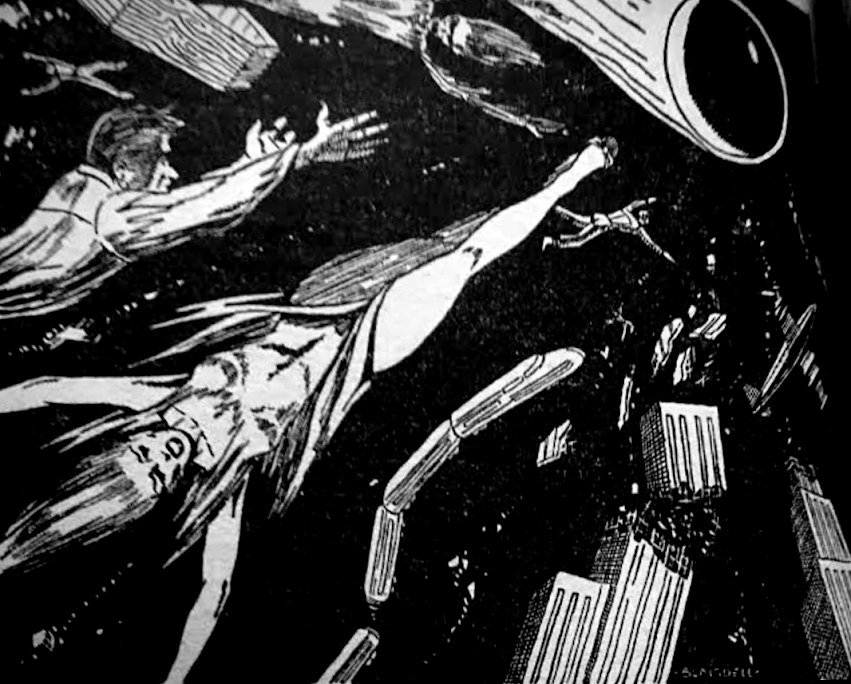 |
| Criswell told an amazing tale in the April 1955 issue of Spaceway. |
The summer of 2023 was the hottest on record, and there are alarming news stories about catastrophic weather events seemingly every week. It often feels as if we're on a collision course with oblivion and that there is no turning back. Sure, we collectively survived Y2K a couple of decades ago, but the human race may well be extinct by the time Y3K rolls around.
In short, these would be great times for Criswell (1907-1982), the well-coiffed prognosticator who became not only Ed Wood's good friend but also an important member of the Wood repertory company with his roles in Plan 9 from Outer Space (1957), Night of the Ghouls (1959), and Orgy of the Dead (1965). More and more these days, we seem to be living through one of the many outlandish doomsday predictions that Criswell made over the years through his columns, books, and other media appearances.
Recently, reader Rob Huffman, host of the YouTube series Sin & Sci-Fi in the '60s, sent me one of those apocalyptic Criswell pronouncements: "The Dying Planet," which Cris wrote for a pulp sci-fi magazine called Spaceway in April 1955. A relatively short-lived publication from William L. Crawford's Fantasy Publishing in Los Angeles, Spaceway lasted only from December 1953 to June 1955 with a brief revival in 1969 and 1970. Criswell was a regular contributor to Spaceway and even appeared on its cover a couple of times. (L. Ron Hubbard also contributed to Spaceway, if that tells you anything.)
 |
| Some artwork by the great Paul Blaisdell accompanied this Criswell story. |
 |
| Spaceway April 1955. |
"The Dying Planet" captures Cris at his bonkers best. In this article, the great seer tells us of a distant yet inhabited planet called Bellarion—whose society mirrors ours in many ways—that is veering away from its usual orbit and will enter our solar system in the "very near future." Our planet will not necessarily perish because of this catastrophe, but there will be numerous consequences ranging from bizarre to tragic to merely inconvenient. Among them:
- "Your hair will not remain combed, but will stand up in wild disarray, due to the coming electrical disturbances."
- "Huge buildings will become loosened from their foundations and will fly off into space."
- "Pregnant women will explode."
- "The skies will rain blood because of the millions of crushed bodies floating in space."
- "In cemeteries, the dead will be lifted from their graves through a strange magnetic force which will influence only dead cells."
That last one I mentioned is especially noteworthy because it presages both Ed's own Plan 9 as well as George Romero's seminal Night of the Living Dead (1968). In Romero's film, the zombie plague is apparently caused by the Venus Space Probe and the radiation it brought back to our planet.
Speaking of classic sci-fi and horror, the Spaceway article is accompanied by artwork from the great Paul Blaisdell (1927-1983), who created iconic monster costumes and other props for such classic B-movies as It Conquered the World (1956), The Beast with a Million Eyes (1955), The She-Creature (1956), and many more. Occasionally, Paul himself would climb into the costumes and portray the monsters himself. It's regrettable that Paul Blaisdell and Ed Wood never had the opportunity to work on a film project together.
Immediately following "The Dying Planet," the April 1955 issue of Spaceway also includes a biographical article about Criswell attributed to one "Charles F. Wireman." I put that name in quotes because "Charles" is pretty blatantly Criswell writing under a pen name. He doesn't even bother to change his telltale writing style from one article to the next. In "The Dying Planet," for instance, Criswell refers to "trend, pattern of habit, and the unalterable laws of cycle," a phrase I also recognized from Criswell's delightful 1970 album. Then, "Charles F. Wireman" uses the exact same phrase on the very next page! So much for covering your tracks.
Regardless of its authorship, the biographical article has some interesting Criswell trivia in it. For instance:
Criswell's favorite character in history is Napoleon, and his favorite age in history is from 1890 to 1900. His favorite American writer is Edgar Allen Poe. Criswell's most cherished newspaper interview was with the late H.G. Wells, who proved to be a great influence.
The article stops short of telling us Criswell's turnons and turnoffs, and for that, I am grateful. I am also grateful to Rob Huffman for sending me this wonderful example of Criswell arcana.

No comments:
Post a Comment